7 Best Low-Carb Alcoholic Drinks to Order at the Bar
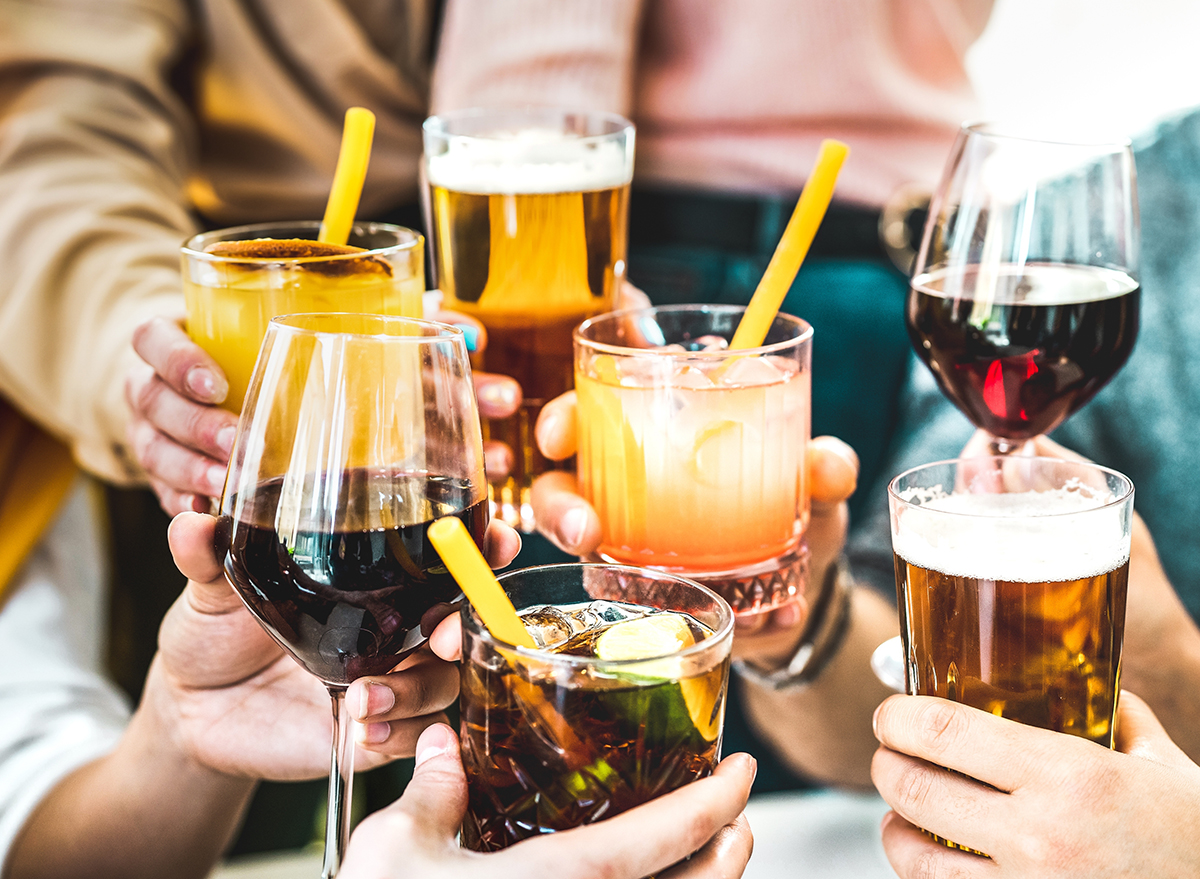
Sticking to health goals can be tricky when alcohol is a big part of social life, from post-work cocktail hours to casual get-togethers with friends. Many popular drinks, such as margaritas, mojitos, and gin and tonics, are refreshing and flavorful but high in carbohydrates from ingredients other than alcohol.
Low-carb alcoholic drinks offer a solution by striking a balance between abstaining and indulging. By omitting sugary flavorings, mixes, and juices, these drinks allow you to enjoy a lower-carb and often lower-calorie option.
Even with low-carb alcoholic drinks, it’s important to monitor alcohol intake. Alcohol provides calories without nutritional value and can affect your health goals. It lowers inhibition and impairs your ability to sense hunger and fullness, leading to increased cravings and appetite.
In this article, we’ll define low-carb alcoholic drinks and suggest what to order at the bar.
What Are Low-Carb Alcoholic Drinks?
Alcohol is naturally carb-free. Liquors like rum, vodka, whiskey, tequila, and gin have zero carbohydrates.
But just because alcohol is low-carb doesn’t mean cocktails are also low-carb. Flavorings, juices, syrups, tonics, and other ingredients used to make cocktails contribute sugars and carbohydrates. Regular cocktails like a margarita can have upwards of 36 grams of carbohydrates per drink, pushing it into high-carb territory.
Low-carb alcoholic drinks skip the juices, syrups, tonics, and other flavorings. Instead, the alcohol is consumed neat, on the rocks, or with sparkling water. Sometimes, a wedge of citrus or a splash of juice is added for flavor.
Already-made drinks like canned cocktails or beer can be produced low-carb. Changes in fermentation and processing methods create a low-carb beverage that retains some of the taste and mouthfeel of traditional drinks.
Low-Carb Drinks to Order
You can order plenty of low-carb drinks at the bar. Below are some recommendations, but this list is not exhaustive. When in doubt, pair your favorite spirit with soda water and a lemon, lime, or orange wedge for a low-carb alcoholic beverage.
Vodka Soda
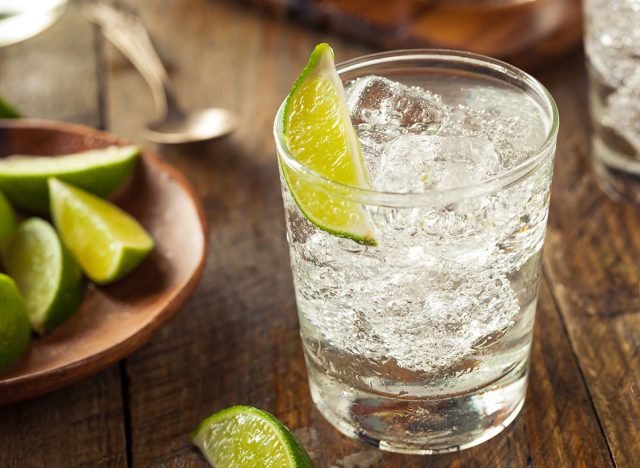
Calories: 133
Carbs: 0
Sugar: 0
ABV (Alcohol By Volume): 8%
Vodka soda is the classic low-carb drink. It is a great cocktail choice with no carbohydrates or added sugar. Sparkling water dilutes the vodka, making the drink last longer without impacting the nutrition profile. Citrus fruits are lower in sugar and carbohydrates than other fruits. Squeeze a lime, orange, or grapefruit wedge into the beverage for some flavor without affecting the calorie or carbohydrate content.
Tequila and Lime

Calories: 65
Carbs: <1 g
Sugar: <1 g
ABV: 33%
A tequila and lime is a lower-calorie alternative to a margarita. Instead of a pre-made margarita mix that is high in carbohydrates, this alternative sticks to the basics: tequila and lime. Ask for a splash of lime juice or flavor the tequila with a lime wedge—both options keep the drink low-carb.
Unless you’re reaching for top-shelf tequila, opt for silver tequila. Top-shelf darker tequilas achieve their coloring from aging processes, whereas lower-quality tequilas use additives like syrups for their gold coloring.
Martini
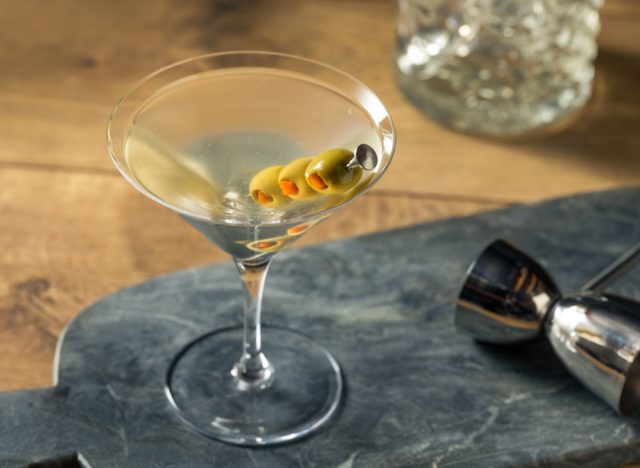
Calories: 241
Carbs: <1 g
Sugar: <1 g
ABV: 29%
A martini is essentially all alcohol. It contains vodka or gin and dry vermouth, an aromatic fortified wine used for flavoring. The high alcohol content contributes to the higher amount of calories per 4-ounce drink. Still, the martini is low-carb. Vodka and gin are zero-carb. Conversely, vermouth contains carbohydrates. However, only a small amount of vermouth is added to a martini, so the carbs are low.
Dry Wine
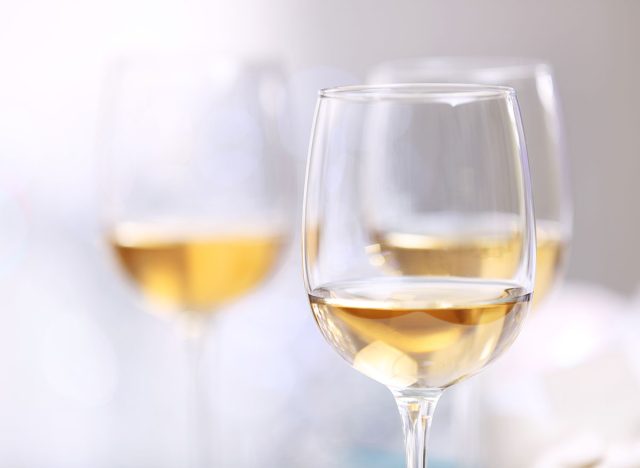
Calories: 122
Carbs: 3 g
Sugar: 0 g
ABV: 11%
Dry wines are a great low-carb drink, with each 5-ounce pour containing about 3 grams of carbohydrates. The fermentation process converts most of the sugar into alcohol, leaving little residual sugar. Because the entire pour contains alcohol, dry wines have a higher ABV than other low-carb alcoholic drinks.
Low-carb dry wines include sauvignon blanc, chardonnay, pinot noir, cabernet sauvignon, and pinot grigio.
Light Beer
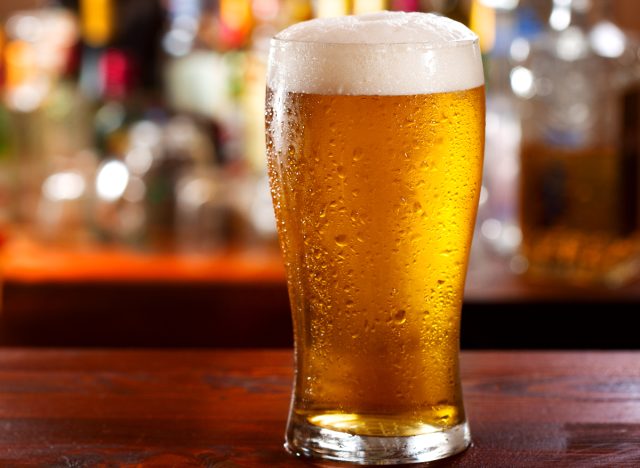
Calories: 103
Carbs: 6 g
Sugar: <1 g
ABV: 3%
Light beers are lower in calories and alcohol than regular beer. Fewer malted grains are used to produce a light beer, and other ingredients like rice and corn are often added to build flavor and body. Light beers may have a weaker taste than regular beer due to changes in the brewing process to create lower-carb and calorie beer. Still, light beers are a suitable low-carb alternative.
Rum and Diet Cola
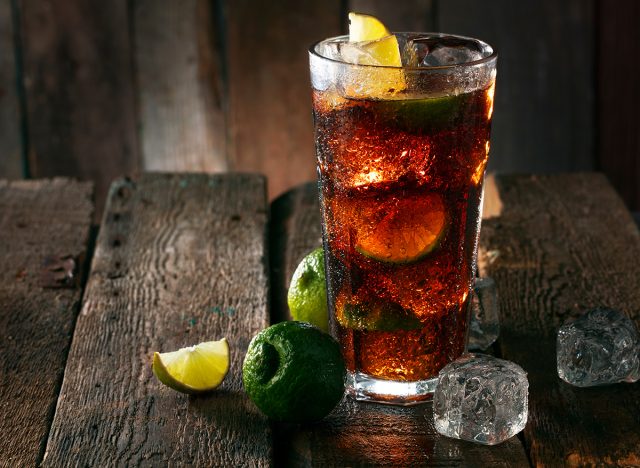
Calories: 135
Carbs: 0.5 g
Sugar: 0
ABV: 8%
Despite being derived from sugarcane, rum is naturally low-carb and sugar-free. However, be aware that some brands add sugar after processing, which can increase the carbohydrate and calorie content. To make an informed choice, check out this list of sugar content in different rums.
Opt for white rum instead of dark rum, as some dark rums use molasses for coloring, which adds to the alcohol’s calorie and carbohydrate content. Use diet cola to reduce the carbohydrate and calorie content of rum and cola. A rum and diet cola has less than one gram of carbohydrate per 8-ounce serving compared to the nearly 18 grams of carbohydrates in a regular rum and cola.
Hard Seltzer

Calories: 99
Carbs: 2 g
Sugar: 2 g
ABV: 5%
Hard seltzers are everywhere these days. They combine soda water, alcohol, and flavoring for a convenient low-carb cocktail. Although the nutrition profile of hard seltzer varies depending on the brand, most are low-carb. Yes, hard seltzers contain sugar cane. But if you look at the nutrition facts panel, added sugar is usually just 1% of the daily value, so hard seltzer is still low-carb. Plus, the different flavors provide multiple options for alcoholic drinks to order at the bar.